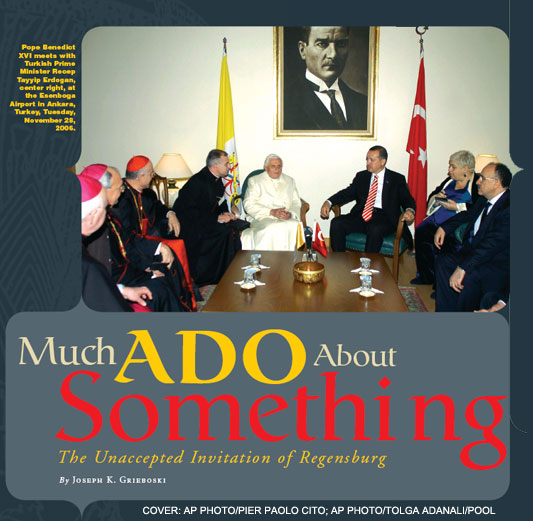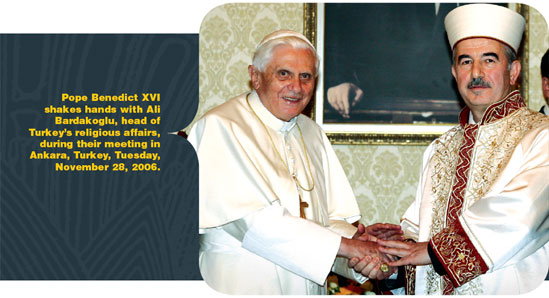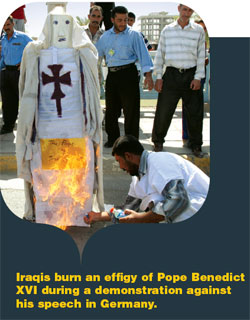Much Ado About Something
Lincoln E. Steed March/April 2007
Getting your Trinity Audio player ready...

The pope's comments unleashed a firestorm of criticism—from Paris to Pakistan, from Cairo to Indonesia to Turkey. The response from Muslim communities was swift, universal, and harsh. It aroused controversy and threatened to create a diplomatic crisis. AsiaNews stated that "the 'lectio magistralis' delivered by Benedict XVI on 12 September in Regensburg was largely badly and selectively quoted, with reference made only to certain extracts. The reaction was such that it prompted the pope to speak about 'misunderstanding' of his words and to put notes and clarifications in the final text to allow for a correct understanding of it."
The Muslim world and other critics focused very heavily upon the reference of the pope to the exchange between "erudite Byzantine emperor Manuel II Paleologus and an educated Persian on the subject of Christianity and Islam, and the truth of both."
The entire lecture, entitled "Faith, Reason, and the University: Memories and Reflections," was very complex, blending philosophy, religion, and theology.
Some Muslim leaders who condemned the pope's words, including Ali Bardakoglu, Grand Mufti of Turkey, admited they had not read the pope's talk, only press reports of the talk. In fact, some of the news reports headlined the pope's speech in inflammatory terms, even when the article more closely adhered to the truth of the pope's text.
While attention was given to this section—in a correct or incorrect interpretation—much was lost in not being mindful of the rest of the lecture. In fact, had attention been paid at all to the rest of the text, one might have recognized that the pope, while making reference to Islam, was in fact speaking to Christians. As Father James V. Schall, SJ, of Georgetown University, has stated, "It is an error to think this lecture was principally about Islam, though Islam is also included in the main theoretical thrust of the lecture. The pope goes to the heart of a question that is of central concern to every non-Muslim who wants to understand recent events, beginning with 9/11, though now stretching back two or three decades, perhaps centuries, involving what we call 'terrorists.' Hopefully, at least some Muslims have the same concerns, namely, whether or not a theological understanding or argument exists that justifies violence in the name of this religion, with its 'jihad' and the suicide bombers. Is or is not such action justified in Muslim theology? If so, why so? If not, why not? This question is asked almost everywhere as a genuine perplexity in dealing with the Islamic world. Not a few who identify themselves as Muslim maintain that violence is indeed justified both in the Koran and in Islamic law and tradition. If no one held that it was so justified or acted on its validity, we would have no problem on this score."

The pope carried two messages in his address at Regensburg: the first was to the Islamic world to engage in the same discussions on the role of reason in faith as was discussed between "erudite Byzantine emperor Manuel II Paleologus and an educated Persian." The second was to the Christian world to take up the same consideration.
Pope Benedict XVI posited in his lectio to the Islamic world that violence in propagating faith is unreasonable and therefore against God, and that, as Robert R. Reilly has clarified, "a conception of God without reason, or above reason, leads to that very violence." Reilly demonstrates that "the revelation of Mohammed emphasizes most particularly, one attribute of God—His omnipotence. Although all monotheistic religions hold that, in order to be one, God must be omnipotent, this argument reduced God to His omnipotence by concentrating exclusively on His unlimited power, as against His reason. God's 'reasons' are unknowable by man. God is not shackled by reason; there is no rational order invested in the universe upon which one can rely, only the second-to-second manifestation of God's will."
The consequences of such a view are earth-shattering. If all that God has created simply exists at the will of God, it cannot be understood in any way at all by the human mind. From this perspective, there are no natural causes to explain the world. "If unlimited will is the exclusive constituent of reality, there is really nothing left to reason about, and the uncreated Qur'an is not open to interpretation."
Without the openness to interpret the Qur'an—through the lack of reason as understood through the theological framework discussed above—then acts of violence in the name of faith and evangelization by the sword are viable and attractive options.
While the pope's approach to the Islamic world in this regard is of significant importance and worthy of much debate and discussion, it is his admonishment of the Christian world that is of far greater importance and worthy of reflection.
Inherent in Benedict XVI's message on reason to the Islamic world was a similar message to the Christian world. The speech largely focused on the history of faith and reason in Christian thought—focusing attention primarily on the influence of Greek philosophy logos on Christianity at the latter's beginning and then on three more recent movements within Christianity that undermined the connection between faith and reason.

Article Author: Lincoln E. Steed
Lincoln E. Steed is the editor of Liberty magazine, a 200,000 circulation religious liberty journal which is distributed to political leaders, judiciary, lawyers and other thought leaders in North America. He is additionally the host of the weekly 3ABN television show "The Liberty Insider," and the radio program "Lifequest Liberty."